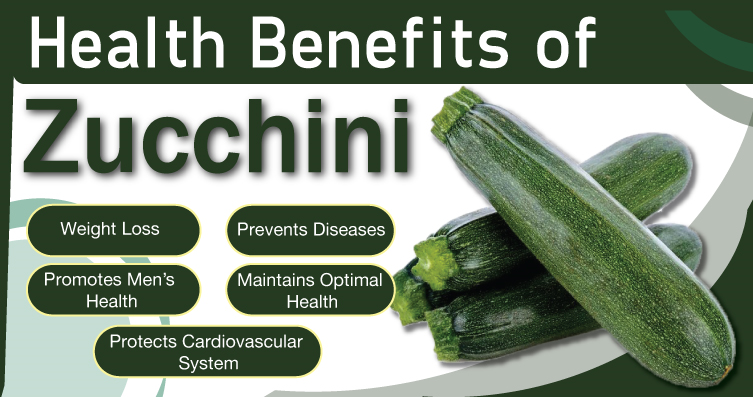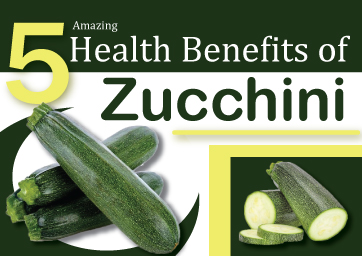Nutrients Facts
- • Calories: 17 gram
- • Protein: 1 gram
- • Fat: less than 1 gram
- • Carbs: 3 grams
- • Sugar: 1 gram
- • Fiber: 1 gram
- • Vitamin A: 40% of the Reference Daily Intake (RDI)
- • Manganese: 16% of the RDI
- • Vitamin C: 14% of the RDI
- • Potassium: 13% of the RDI
- • Magnesium: 10% of the RDI
- • Vitamin K: 9% of the RDI
- • Folate: 8% of the RDI
- • Copper: 8% of the RDI
- • Phosphorus: 7% of the RDI
- • Vitamin B6: 7% of the RDI
- • Thiamine: 5% of the RDI
Read Also: - 7 Health Benefits Of Yellow Bell Pepper
- 5 Health Benefits of Zucchini

- 1. Weight Loss
You
might be surprised to know that consuming zucchini will help you lose weight
considerably. It is extremely low in calories, but it gives you the feeling of
being full. Therefore, it is a great way to satisfy your appetite without
grabbing calories or starting a crash diet plan. Apart from the low-calorie
count, it has high water content and is rich in fiber. Hence, when you eat it,
your stomach is not empty, thereby making zucchini recipes perfect if you are
on a diet.
Read Also: - Lose Weight in a Month by Diet and Exercise
2. Maintains Optimal Health
Already being an
outstanding source of manganese and vitamin C, zucchini
is also the best source of dietary fiber that will keep your
body in the best shape for the long run. It also contains vitamin A, magnesium,
folate, potassium, copper, and phosphorus. This summer squash also has a high
content of omega-3 fatty acids, zinc, niacin, and protein. Moreover, vitamin
B1, vitamin B6, vitamin B2, and calcium in zucchini assure optimal health. It
is probably the best squash having an array of nutrients, including sugar, carbohydrates,
soluble and insoluble fiber, sodium, minerals, amino acids, and more. The
folate ingredient of this squash is highly recommended for pregnant women as
well.
3. Promotes Men’s Health
Many
researchers have taken extracts from this squash to conduct certain studies and
concluded that this fruit has certain properties that effectively treat an
ailment in men called BPH or Benign Prostatic Hypertrophy. BPH is a condition
where the prostate gland becomes enlarged in an odd shape and size, which then can
cause trouble with both sexual and urinary function. A good treatment of this
is seen in combination with other foods that contain phytonutrients; zucchini
is said to be extremely useful in decreasing BPH symptoms.
Read Also: - 7 Impressive Benefits Of Green Beans
4. Prevents Diseases
Your
overall health will surely improve if you consume zucchini regularly. It helps
prevent all kinds of diseases in a general sense. Studies have already declared
that fiber-rich foods help alleviate cancer conditions by washing away
cancer-causing toxins from cells in the colon. The vitamin C, folate, and
beta-carotene in zucchini help to protect these cells from the harmful
chemicals that can lead to colon cancer. Beta-carotene and vitamin C also have
anti-inflammatory properties, thereby naturally curing ailments like
osteoarthritis, asthma, and rheumatoid arthritis, where swelling is immensely
painful. The copper percentage in it also helps in reducing the symptoms of rheumatoid arthritis.
5. Protects Cardiovascular System
It
is rich in nutritional value, especially during the summer, when it delivers
countless advantages to the body. The food ranking systems in zucchini-rich
countries have declared that this squash has abundant levels of manganese and
vitamin C that help to keep the heart strong.
During
the research, most of these nutrients were found effective in the prevention of
diabetic heart disease and atherosclerosis. The magnesium content notably
reduces the risk of heart attacks and strokes. In combination with potassium,
magnesium also helps in reducing high blood pressure. The vitamin C and
beta-carotene found in summer squash help in preventing the oxidation of
cholesterol. Oxidized cholesterol builds up on blood vessel walls, but these
nutrients reduce the development of atherosclerosis. The vitamin folate is
required by the body to eliminate an unsafe metabolic byproduct called homocysteine which can result in heart attack and stroke if the levels rise
too high. Its fiber content lowers high cholesterol levels as well, thereby
helping to reduce the risk of atherosclerosis and heart diseases due to
diabetes.
Read Also: - Heart Disease Causes Prevention And Treatment



 Contact Us
Contact Us






 Hospitals
Hospitals
 Doctors
Doctors
 Diagnostic
Diagnostic
 Pharmacy
Pharmacy
 Health Tips
Health Tips
 Blog
Blog


















Comments